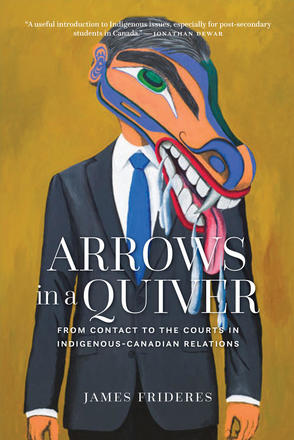
Arrows in a Quiver
From Contact to the Courts in Indigenous-Canadian Relations
Description
In response to the Truth and Reconciliation Commission’s report, Arrows in a Quiver provides an overview of Indigenous-settler relations, including how land is central to Indigenous identity and how the Canadian state systematically marginalizes Indigenous people. Illustrating the various “arrows in a quiver” that Indigenous people use to fight back, such as grassroots organizing, political engagement, and the courts, Frideres situates “settler colonialism” historically and explains why decolonization requires a fundamental transformation of long-standing government policy for reconciliation to occur. The historical, political, and social context provided by this text offers greater understanding and theorizes what the effective devolution of government power might look like.
A comprehensive political and legal overview of Indigenous-settler relations in Canada, written at a level appropriate for post-secondary students, this book is an essential primer for understanding these key relations in Canada today.
“A must-read for non-Indigenous settlers in Canada.” ─David McNab, co-author of Canada’s First Nations: A History of Founding Peoples from Earliest Times
“James Frideres has devoted his professional life to analysing this critical topic from multiple perspectives [and now, in Arrows in a Quiver,] he offers crucial insights for possible ways forward.” ─Arthur J. Ray, OC, FRSC, Professor Emeritus of History, University of British Columbia, and author of Aboriginal Rights Claims and the Making and Remaking of History
Reviews
"[T]his book is a good starting point for non-specialists who wish to have a better understanding of Indigenous-Canadian relations. It provides an introductory starting point to the history of contemporary Indigenous-Canadian relations. I would even suggest reading this book prior to engaging in deeper or more complex texts or resources; it provides the context for those deeperer understandings. " —Naomi Sayers, Journal of Canadian Native Studies 40:1 (2020)